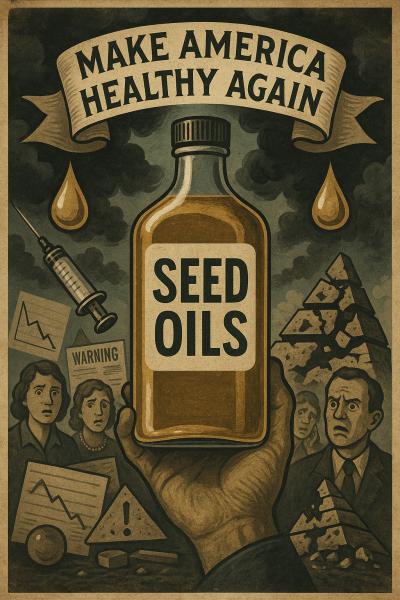
Seed oils have had a rough ride, especially since MAHA took over. We’re being inundated by claims that seed oils are toxic, cause inflammation and chronic disease, and are generally risky for our health. Seed oils are not the only foods being demonized, but are currently a focal point for MAHA and people in positions of power within the Trump Administration. The Associated Press reported that,
“Robert F. Kennedy Jr., the new health secretary, has said Americans are being “unknowingly poisoned” by seed oils and has called for fast-food restaurants to return to using beef tallow, or rendered animal fat, in their fryers instead.”
“I think seed oils are a good example of where we could benefit from a consolidation of the scientific evidence.”
- Marty Markary, MD, Commissioner, FDA
Therein lies the rub. Nutrition science is notoriously difficult. Consolidating it sounds easy, but once you peek under the hood, it reveals itself as a machine full of complexities.
Difficulties of Nutrition Research
First, nutrition research is often limited by the methodologies that can be utilized. The gold standard, randomized controlled trials, are rarely possible. Ditto natural experiments. This means randomization, which is important in reducing bias, is practically unattainable. When bias exists, conclusions are not generalizable.
Second, the time spent studying a specific diet or dietary components is rarely long enough to provide much information about a lifelong habit. A dietary study is typically six weeks to three months long. Long-term studies are rare, yet definitive conclusions are hard to come by without them.
The third reason is tied to the first two: causal links are nearly impossible to establish because of the methodology and time limits on research. Rarely can we say that x causes y. For example, we can’t actually say that seed oils cause inflammation.
For these reasons, nutrition research and corresponding conclusions usually involve many caveats and confounders, making communication about nutrition research an especially delicate dance.
These are the legitimate reasons why nutrition research is difficult, but as I've written about, some people are particularly motivated to engage in junk science, especially around nutrition.
The Example
Enter the search term “linoleic acid” in PubMed, and one of the first articles returned is a 2023 review of linoleic acid published in the journal Nutrients. At first glance, it seems to check all the boxes about seed oils and inflammation since linoleic acid is the central focus of seed oil concerns.
Before even diving into the substance of the article, there are immediate red flags that should be acknowledged and investigated.
- The Journal: Nutrients has appeared in my work before about junk science. There have been ethical complaints about the journal, and the publisher was included on the notorious Beall's List of Predatory Publishers.
- The Authors: The Lead author is the infamous Joseph Mercola, of Disinformation Dozen fame. He's a chiropractor who sells supplements. [1] Mercola's coauthor is also a familiar name, though admittedly less famous: Chris D'Adamo. I’ve covered some of the questionable “research” he’s published that I classify as “wellness junk science.” The pairing of the two of them should automatically raise eyebrows.
- The Methodology: A narrative review. I last critiqued an article published in Nutrients because it was a similar type of cherry-picked “review.” It’s easy to ignore evidence that doesn’t fit your narrative by simply not incorporating it, allowing you to cast disagreeable evidence as “outliers” and “flukes.” Mercola has written about seed oils and claimed they are “The Worst Ingredient For Your Immune System.” This was before his latest review was published, so he came to this “peer-reviewed” article with a very specific point of view.
Mercola directly benefits from fear-mongering about seed oils, not from engaging in scientific discourse or research. However, finding a questionable academic with ties to a supplement company and publishing a “narrative review” on a topic that will directly make you money selling supplements while providing a veneer of scientific legitimacy? That is pure gold for him.
The point is not to weigh in on the seed oil wars, though plenty of registered dietitians and professional organizations have stated that seed oils can be a part of a healthy diet. The point is to show how easily MAHA and those aligned with MAHA have been manipulating the narrative around their pet topics. It’s a lot of virtue signaling and profiteering, putting a health halo around specific foods and supplements, while vilifying others. It also adds unnecessary stigma to those who can’t afford to choose the “healthier” options. Mercola and his compatriots have been profiting directly from demonizing seed oils. If nothing else makes you doubt the hype around how bad seed oils are, that should.
The seed oil conversation is more nuanced and complicated than MAHA is making it out to be. But they have come prepared with their particular beliefs and are unwilling to learn about the science. Wellness influencers, charlatans, and grifters. Junk science. Science illiteracy. All coalescing around seed oils, but it is generally the playbook for RFK Jr./MAHA and healthcare. Be prepared to see even more of this and recognize it for what it is.
[1] For more information on Dr. Mercola, Jonathan Jerry at the Office for Science and Society at McGill University has been keeping a close eye on his recent antics.



